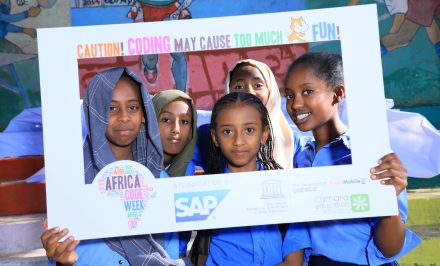 Cameroon : Dr. Yasmine Ndassa, the research scientist turned data storyteller
Cameroon : Dr. Yasmine Ndassa, the research scientist turned data storyteller
 Julien Ngum Che : advocating for the rights of displaced women and youth in Cameroon
Julien Ngum Che : advocating for the rights of displaced women and youth in Cameroon
 Chilufya Mutale Mwila, the Zambian entrepreneur driving financial inclusion across Africa
Chilufya Mutale Mwila, the Zambian entrepreneur driving financial inclusion across Africa
 Wangari Muchiri, the Kenyan engineer committed to accelerating the ecological transition in Africa
Wangari Muchiri, the Kenyan engineer committed to accelerating the ecological transition in Africa


For its 2021 edition, Africa Code Week, an initiative aimed at introducing young people and teachers to coding, has trained 48% of the 1.8 million beneficiaries of the program this year. Supported by SAP, UNESCO, ADEA and Irish Aid, the initiative aims to increase the number of girls and women in digital technology in Africa each year.
On the continent, there is a considerable gap between women and men in careers in Science Technology Engineering Mathematics (STEM). According to UNESCO figures, Africa is below the global average, with only 28% of women pursuing STEM careers. A trend that Africa Code Week aims to reverse by training more girls in coding.
According to Twafik Jelassi, Assistant Director-General for Communication and Information at UNESCO, “it is particularly important to address the gender gap in STEM careers, especially as they are often described as jobs of the future, promoting innovation, social welfare, inclusive growth and sustainable development ».
Reducing gender inequality through digital technology
To inspire more girls and prepare them for the jobs of tomorrow, Africa Code Week organised the Women Empowerment Program, a professional development seminar that aims to equip African women educators with the skills and knowledge to teach successfully. The aim of the program is to bridge the digital divide between women and men.
Another highlight of this edition is the 2nd AfriCAN Code Challenge, an annual pan-African coding competition where young people are tasked with coding a game to help solve societal problems. The competition is organised in partnership with Jokkolabs, a network of innovation spaces in Senegal.
For this edition, Morocco was the country that mobilised the most young people, with 1.5 million of the 1.8 million young people trained in coding in 2021 during Africa Code Week. Of all the teachers trained, 11,000 came from Morocco.
Since the launch of Africa Code Week in 2015, over 10 million young people and teachers have been introduced to coding. For the 2021 edition, the initiative has also helped train more than 7,000 young people with disabilities in digital technology.